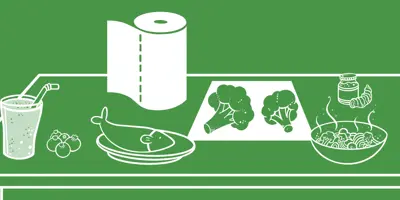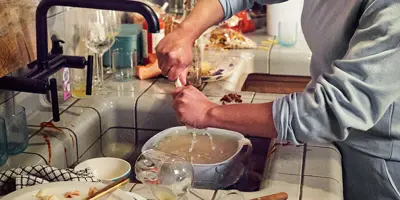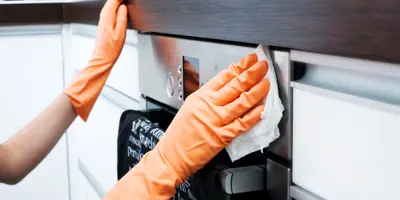1 person found this helpful

How do you like your eggs in the morning? Boiled, fried, poached, scrambled – or slopped down the stairs as you deliver a Mother’s Day breakfast in bed? (She really appreciated the gesture!) While most of us can agree that eggs taste great, opinions can be more divided on egg preparation: namely, should you wash eggs before using them? Learn about the importance of washing eggs, and how to store eggs, to keep your food hygienic and protect your loved ones.
Our guide covers everything there is to know about egg cleaning:
- The importance of proper egg handling
- Whether you should wash eggs or not
- How to clean eggs
- How to store eggs
- How to store boiled eggs
Washing eggs: the importance of proper egg handling
Provided you’ve gotten them safely home from the shops without any crunches, cracks or straight up splats in the supermarket carpark – and without bursting into laughter with your shopping partner at the site of four leaky eggs drooping over the rest of your shopping, of course – it’s time to store your eggs. The way we handle and store eggs is crucial for maintaining good food hygiene and safety. Eggs can be contaminated with bacteria, notably salmonella, which is known for its ability to cause severe food poisoning.1
Salmonella is a natural habitant of poultry’s intestinal flora and can be found on the eggshell, either while the egg is being laid or after it’s laid.1,3 If not handled properly, the salmonella bacteria can penetrate through the shell and infect the egg. Essentially, eggs can become infected with salmonella at any stage if it comes into contact with the bacteria, from production, to transport, all the way up to how consumers store and handle them.3
As consumers, it’s therefore important to ensure that eggs are stored and handled properly to prevent foodborne illnesses. Salmonella is a health risk to everyone when present in a certain quantity, but it can be dangerous to young children, the elderly, and individuals with weakened immune systems even in smaller quantity, as they are more likely to become seriously unwell from food poisoning.1 Taking the right hygiene measures when handling your eggs and ensuring that you’re using fresh ones for consumption helps protect your more vulnerable loved ones!
If you or a loved one has food poisoning and symptoms are worsening, reach out to your GP who will be able to advise. If you or anyone else is experiencing high temperature, becoming weak or falling unconscious, you should call an ambulance immediately.
Should you wash eggs?
To wash or not to wash? This egg debate has yet to be definitively settled. In reality, the answer to whether you should wash eggs are not is: it depends.
On the one hand, freshly-laid eggs have a natural protective coating called the “bloom” or “cuticle”, which helps to prevent bacteria from entering the egg.4,5 This coating could still be there when the egg reaches the supermarket, and that’s why some argue that washing freshly laid eggs could remove this natural barrier and increase the risk of contamination. Moreover, when you wash eggs with water that is not warm enough, it can create a “vacuum” effect that sucks the water and potential bacteria into the egg, through the pores in the eggshell.4,5
Considering the fact that eggs sold in the UK are required to be produced, handled, washed and sanitised in a way that meets the EHO hygiene and food safety standards, some people believe that cleaning eggs is not necessary.6
On the other hand, some consumers don’t feel reassured by the idea of not washing their eggs, since, as mentioned above, salmonella could still be on the eggshell and could contaminate you and your loved ones through contact. To reduce the risk of contamination, don’t forget to wash your hands with soap after touching the eggs and their box. Store the eggs separately from foods that are consumed without heat processing, and do not put the eggs and their box on the same surface as other foods to avoid contaminating them.
Washing eggs is necessary when cooking with raw eggs, or when they are really dirty – although this should normally not happen with supermarket eggs because of the handling standards they have to respect. If you do decide to wash your eggs before using them, it’s important that you do it properly.
Tip
Cooking with friends and family is a wonderful way to decorate your clothes with a variety of tomato sauces spills, chocolatey chunks and sticky sweet chilli stains, all while making heart- and belly-warming memories in the kitchen. But why stop there? Learn how to make your own recycled cardboard animals and turn those memories into something that lasts longer than a meal.
How to clean eggs
Are your eggs’ shells looking dirty? If you want to clean them, it’s important to do so in a way that minimises the risk of contamination.7 Here’s how to clean eggs:
- Add 1 or 2 table spoons of baking soda to warm water.
- Gently rub your eggs using the solution of water and baking soda, and a strong paper towel.
- Dry the egg immediately with a clean paper towel.
- Use the egg straight away, or store it properly. Keep reading to find out how to store eggs!
Tip
Whether it’s six eggs or two dozen, Plenty Flexisheets have more perforations per sheet, meaning you choose what you use and you’ll always have the perfect amount of kitchen roll for the task. It’s still just as strong an absorbent and is 50% longer*. It’s no wonder it’s been voted Product of the Year for 2024.**
How to store eggs properly
Proper egg storage is key for maintaining their freshness and ensuring they are safe to eat. Follow our tips on how to store eggs:
- Keep eggs in their original carton: The carton protects the eggs and prevents them from absorbing odours from other foods in your refrigerator.
- Store eggs in the main body of the refrigerator: Ensure that the temperature is consistently below 4°C to prevent the growth of salmonella.8
- Do not store eggs in the refrigerator door: The temperature here fluctuates more, which is not ideal for preserving the freshness of eggs.9
- Do not store eggs in places where it could touch other foods and contaminate them.
Tip
Remember to always check the use-by date on eggs, and to use them by the indicated date.
You now know how to keep eggs at their best to cook delicious, and safe meals for your loved ones! Now, it’s on to the real task... How to magic these six eggs and a spattering of cocoa and flour into a mega chocolate fudge cake for the dinner guests! We recommend donning old clothes you don’t mind getting caked in scrumptious stains of chocolate and enlisting any enthusiastic helpers. It’s about to get floury, funny and furiously fudgy!
How to store boiled eggs
Importantly, hard boiled eggs require specific storage methods to ensure they remain safe to eat. Here’s a guide on how to store boiled eggs:
- Allow boiled eggs to cool completely before storing them. It’s best to store unpeeled boiled eggs, so that they can be protected by their shells.
- Once the eggs have cooled down, dry them with a sheet of kitchen towel.
- Place the boiled eggs in an airtight container.
- Store the container in the refrigerator, at a temperature below 4°C, once again.8
- Consume boiled eggs within a week for optimal freshness and safety.10
Remember that these tips apply to boiled eggs, and dishes containing cooked eggs (such as an egg salad, for example). Dishes with raw eggs should be handled and stored with an extreme level of caution.
We use eggs in a lot of our meals, so it’s important to handle and store them properly to prevent foodborne illnesses, and keep ourselves and our loved ones safe. If you’re still wondering “should you wash eggs?”, the answer is, yes. It is strongly recommended to wash eggs, especially if they are used raw, for example when making a dessert. You should always follow the guidelines on how to wash eggs properly, and on how to store eggs.
So, the next time you're in the kitchen, navigating through the flour spills and eggshell trails left from your culinary quests, remember these tips to ensure that it's not only delicious but safe and enjoyable to eat! Amidst the chaos of splattered pancake batter on the ceiling from your housemate’s overenthusiastic flipping, keeping food hygiene and safety in mind is essential.
For more food hygiene and safety tips, you can also read our articles on kitchen hygiene rules and on kitchen hygiene tips for kids. After all, good kitchen hygiene habits start early!
*Length of roll when compared to Plenty Original
**Winner General Household Category. Survey of 8,000 people in UK & ROI
Sources:
1 Food Standard Agency, “Salmonella”
2 Centers for Disease Control and Prevention, “Salmonella and eggs”
3 Food Standard Agency, “Salmonella risk profile of UK-produced hen shell eggs: Exposure assessment”
4 US Department of Agriculture, “Should eggs be washed before they are used?”
5 Food Safety Authority of Ireland, “Egg washing”
6 Laid in Britain, “Government legislation: egg marketing”
7 The Livestock Project, “Eggs - is washing and refrigerating necessary?”
9 US Department of Agriculture, “Refrigeration & food safety”
Related articles
5 of the best brain foods for focus
Give the old grey matter a boost with the best brain food. Here we highlight five brain healthy foods to help improve brain power and cognitive function.

How to wash fruit and vegetables at home
If you’d like to learn how to clean fruits and vegetables properly this is the article for you. Follow our step-by-step guide to washing fruit & veg here.

Kitchen Safety Rules
Want to enjoy the fun of cooking with all the family? Learn some basic kitchen rules, so you can all cook the safe way and not have to worry about accidents!

How to clean oven door glass
Tired of seeing stains on your oven door? Learn how to best clean your oven glass door using one of two simple methods with a little help from Plenty.

Clever tips for cooking perfect rice
Ever wondered how to make rice perfectly? Give this rice method a try and follow our top tips for cooking rice and you’ll enjoy great results every time.

2 easy yet stylish ways of folding paper napkins
Looking for paper napkin folding ideas? Look no further. Find out how to fold napkins into 2 beautiful shapes here.


